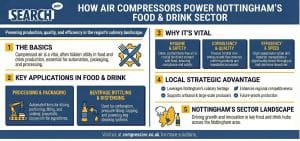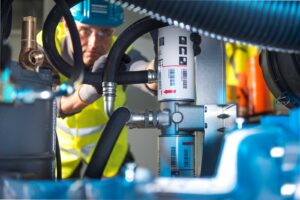How Air Compressors Power Nottingham’s Food & Drink Sector
Electricity, water, and gas – without these three utilities, food and beverage production simply could not function.
But there is a fourth element, just as essential to nearly every aspect of the manufacturing process: compressed air.
This hidden powerhouse is central to modern food production. It helps Nottingham’s diverse manufacturers work cleanly and efficiently – and in doing so, it safeguards their brands.
Nottinghamshire’s food and drink industry is one of the county’s great success stories.
It is an industry whose foundations are rooted in quality and reputation. From industry giants like Castle Rock Brewery to international specialists such as Colston Bassett Dairy, and our many innovative artisan producers, there’s one thing we all have in common.
Behind every modern, efficient food production or packaging plant, as well as many traditional cheesemakers, lies a demand for clean, reliable, and efficient compressed air. It’s the fourth utility that’s often taken for granted, but which should not be overlooked.
Understanding and optimising your compressed air system is a key part of your business – and a vital piece in your competitive edge.
The Critical Role of Compressed Air in Production
Here’s how compressed air supports critical operations across Nottingham’s food and beverage industries:
| Sector | Key Applications | Critical Air Requirements |
| Breweries | Wort aeration, keg washing, bottling | Oil-free, Class 0, consistent pressure |
| Bakeries | Flour conveying, air knives, and automated packaging | Particle-free, dry air |
| Dairies | Blow-moulding, fermentation, robotic milking | Sterile, oil-free, dry air |
| General Food | Sorting, cooling, vacuum packaging | High-purity, moisture-free |
| Packaging | Carton erecting, sealing, and vacuum lifting | Reliable supply, consistent pressure |
Powering the Pint in Nottingham’s Breweries
In breweries, compressed air is vital for both quality and consistency. During fermentation, a precise flow of sterile, oil-free air provides the oxygen yeast needs to thrive.
Without it, oil can kill the yeast – or worse, spoil the batch with unwanted flavours.. A ruined batch not only incurs financial costs but can also seriously damage the brewery’s reputation.
Compressed air is used to drive the pneumatic actuators that control the high-speed bottling and canning lines, and serves as the primary power source for the keg washing machines.
Perfecting the Batch in Nottingham’s Bakeries
In commercial bakeries, compressed air is used to hygienically transport flour and other dry ingredients through enclosed pipework to protect them from airborne contaminants.
It is used to power depositors which precisely inject fillings into pastries, and also for ‘air knives’ (high-velocity jets of air) to blow away excess flour and crumbs before packaging.
Ensuring Purity in Nottinghamshire’s Dairies
Did you know the dairy industry has some of the strictest hygiene standards? In blow-moulding machines, sterile plastic milk bottles are made using compressed air and then inflated to their final shape.
Jets of sterile air then provide a “blanket” over filling and sealing machines.
This air forms a barrier against airborne microbes. That protection helps stop spoilage. It also extends the shelf life of milk and other dairy products. As a result, they stay fresh for longer – without the need for preservatives.

Clean oil free compressed air is essential for safe efficient food and drink production in Nottingham
The Non-Negotiable: Air Purity and Food Safety Compliance
Poor-quality compressed air puts products at risk of contamination. It can also leave a business out of step with regulations. The consequences are severe. It can include spoiled products, expensive recalls, and long-term damage to brand reputation.
Air purity is defined in accordance with the international standard ISO 8573-1. The classification for air purity is primarily for applications where the compressed air is in contact with food (during processing).
Class 0 oil-free air is the international industry standard, as it provides absolute assurance that the compressor does not add oil contamination to the air stream. (See our technical article on Oil-Free vs Oil-Lubricated Compressors for more information).
Food safety standards in the UK – like the Hazard Analysis and Critical Control Point (HACCP) plans and the British Retail Consortium (BRC) Global Standards – build these technical requirements into their frameworks. Producers are expected to meet them as part of day-to-day operations.
Air drying and filtration are essential for keeping moisture and particulates under control.

How Air Compressors Power Nottingham’s Food & Drink Sector
Driving Efficiency: Reducing Energy Costs and Environmental Impact
Generating compressed air can take up a large share of a manufacturing facility’s electricity costs. Two key technologies transform this cost centre into a source of substantial savings.
Slashing Energy Bills with Variable Speed Drive (VSD)
Food production rarely has a consistent demand for compressed air. A traditional fixed-speed compressor is highly inefficient under these conditions.
A Variable Speed Drive (VSD) compressor adjusts its motor speed in real-time to precisely match air demand. For facilities with fluctuating loads, a VSD can reduce energy consumption by an average of 30-50%, with some cases showing savings up to 70%.
Turning Waste Heat into a Valuable Asset
Up to 94% of the electrical energy a compressor consumes is converted into heat, which is typically vented into the atmosphere. An energy recovery system captures this heat and transfers it to water.
This creates a free source of hot water for cleaning, sanitation (CIP systems), process heating, or pre-heating boiler feed water. A properly implemented Energy Audit is the first step to identifying these opportunities.
The Atlas Copco Advantage for Food & Drink Manufacturers
As a Premier Distributor for Atlas Copco, Search Air correctly installs market-leading equipment designed for the food sector. Atlas Copco’s Z-Series compressors were the first in the world to be certified Class 0, setting the industry benchmark for air purity.
These models feature advanced VSD+ technology, directly connecting the flagship oil-free product to the energy efficiency claims made earlier.
Proactive Uptime with Advanced Monitoring
Atlas Copco systems offer advanced technology to ensure reliability and compliance.
- SMARTLINK offers remote monitoring services that allow system performance to be checked from anywhere, and predictive alerts are sent before a fault occurs.
- AIRScan diagnostics go further to examine the entire compressed air system and can pinpoint where inefficiencies or future problems lie before they have a chance to disrupt production.
- AIRPlan and TotalCare maintenance plans utilise the power of predictive analytics to plan your service, reducing the likelihood of unexpected failures and helping to maintain ISO and BRC compliance.
Expert Air Compressor Maintenance in Nottingham: Reduce Downtime and Contamination
A compressor breakdown can stop production in its tracks. One failure, and the whole line is down. Regular, professional maintenance helps prevent that, protecting efficiency as well as reliability.
Skip it, and the risks pile up. This can include things like unnecessary downtime, product contamination, and wasted energy from leaks.
Professional air leak detection services can pinpoint and measure that waste – often saving enough to cover their own cost in a short time.
A comprehensive maintenance plan keeps filters, seals, and other components on schedule for replacement – protecting both air quality and machine health. For facilities in Nottingham, having reliable local support is just as important.
Expert air compressor service contracts provide the reassurance of scheduled maintenance, along with a quick 24/7 emergency response.
Your Partner for Safe and Efficient Production in Nottingham
For Nottingham’s food and drink producers, a modern, efficient, and well-maintained compressed air system is a strategic asset. It supports top product quality, keeps operations compliant, and drives stronger financial performance.
As local specialists, Search Air understands the unique challenges of the sector. We design, install, and maintain complete systems using best-in-class Atlas Copco technology. We provide a comprehensive solution for air compressors in the food and drink industry, ensuring your fourth utility always works for you.
Whether you’re producing craft ale in Sneinton or bottling dairy in the Vale of Belvoir, Search Air provides the local Nottingham air compressor expertise you can count on.
To help you understand the potential for improvement in your facility, we invite Nottingham’s food and drink manufacturers to schedule a free, no-obligation Compressed Air System Health Check.
This assessment includes visual inspections, air quality spot tests, and energy-saving opportunities – carried out by a local Search Air engineer with an under 3-hour response time. Schedule your system assessment today to enhance efficiency, lower costs, and maintain compliance.
Frequently Asked Questions
How often should I test my compressed air quality for BRC compliance?
BRC recommends compressed air quality testing to be carried out as appropriate to the risk assessment. In most food and beverage manufacturing and bottling facilities, this equates to at least one annual professional air quality test. In high-risk applications, more frequent testing will be required.
Can I really save money by upgrading to a VSD air compressor?
Yes. Facilities with variable air demand can save significantly on energy costs by installing a VSD compressor. Varying shifts, production runs, and CIP cleaning cycles in food production can mean that your plant’s air demand rarely matches the set motor speed of your current compressor.
VSD air compressors adjust the motor speed in real-time to match demand, reducing the compressor’s energy consumption by 30-70% and typically delivering a swift payback.

